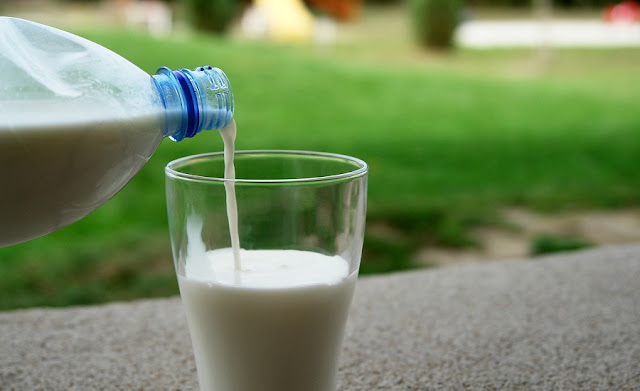Benefits of goat milk for babies
The benefits of goat milk
for babies is something that you should take seriously if you are currently
breastfeeding your baby. This post will look at some of the numerous
benefits of goat milk for the baby, Benefits of goat milk for infants, Benefits
of Goat Milk for the First 1 Months, Benefits of goat milk for baby skin,
Goat's Milk Nutrients, Calcium content in goat milk and discuss whether goat
milk is the right choice for you and your baby.
Benefits of goat milk for babies
Nutritionists recommend that
babies be fed goat's milk instead of cow's milk because it is easier to digest
and has more nutrients. Cow's milk is high in protein and cholesterol, but low
in essential fatty acids and vitamins. Goat's milk is high in essential fatty
acids and vitamins, but low in protein and cholesterol. Goat's milk is also a
good source of calcium, phosphorus, magnesium, potassium, zinc, and selenium.
These minerals are all important for baby's growth and development.
Benefits of goat milk for infants
There are many benefits of
goat milk for infants. Goat milk is a great source of protein, calcium, and
other essential nutrients that can help babies grow and develop properly. In
addition, goat milk is easier to digest than cow milk, and it contains less
lactose. This makes it a good choice for babies who are lactose intolerant or
have trouble digesting cow milk. Goat milk also has a high antioxidant content,
which can help protect against oxidative damage and improve overall health. For
all these reasons, goat milk is a great choice for infant nutrition.
Benefits of Goat Milk for the First 1 Months
There are a lot of benefits of goat milk for the first 1 months. Goat milk has been consumed for centuries by humans for its health benefits. Here are some reasons why you should consider consuming goat milk during the first 1 months of your child's life:
1.Goat milk is high in nutrients and minerals that are essential for your baby's growth and development.
2.Goat milk is a great source of protein, calcium, and vitamin D, which are all important for your child's health.
3.Goat milk is easy to digest and is gentle on your baby's stomach.
4.Goat milk helps protect your baby against infections and illnesses.
5.Goat milk can help improve your baby's immune system.
6.Goat milk is a great source of antioxidants, which
help protect your baby's cells from damage.
Benefits of goat milk for baby skin
Goat Milk have unique
benefits for skin health. Goat milk contains high levels of nutrients like
vitamin A, D, E, B6, and B12. It also has important fatty acids like omega-3
and omega-6 that are beneficial for baby skin. Goat milk is a good source of
probiotics, which can help improve gut health. In addition to being a
nutritious choice for babies, goat milk is also gentle on sensitive skin. It is
often recommended for babies with eczema and other skin problems. If you're
looking for a healthy and safe baby formula option, consider goat milk formula.
When drinking milk as a baby is most beneficial
When is the best time to
give your baby milk? New research suggests that there may be an ideal time,
according to a study published in The Journal of Pediatrics. The study,
conducted by researchers at University of California, Davis, looked at whether
the timing of milk feeding affected a baby’s weight gain and growth. It found
that babies who were exclusively breastfed and given milk only during the night
gained more weight and grew faster than those who were given milk during the
day and night. These findings suggest that there may be a window of opportunity
for introducing solid foods to babies, between 4 and 6 months old, when they
are still gaining weight and growing quickly. After this point, the rate of
growth begins to slow down.
Goat's Milk Nutrients
Did you know that goat's
milk is one of the most nutrient-rich milks available? It contains important
minerals like calcium, potassium, and magnesium, as well as vitamin A, B6, and
B12.
Goat's milk is a
nutrient-rich drink that has many health benefits. Read on to learn more about
the nutrients in goat's milk and how they can benefit you. Goat's milk is a
nutrient-rich drink that has been used for centuries to promote health and
healing. Goat's milk is high in calcium, potassium, vitamin A, and vitamin D,
and it contains beneficial fatty acids and minerals that are not found in cow's
milk. Here are some of the top nutrients in goat's milk and their health
benefits:
1. Calcium: Calcium is essential
for strong bones and teeth. Goat's milk is high in calcium, providing 300 mg
per cup.
2. Potassium: Potassium is
vital for keeping blood strain and fluid balance. Goat's milk carries 490 mg of
potassium in keeping with cup.
Disadvantages of goat milk for babies
Here is a look at some of
the disadvantages of using goat milk for babies:
1.Goat milk may not be
nutritionally adequate for infants.
2.Goat milk isn't as
nutrient-rich as cow milk.
3.Goat milk is higher in
lactose than cow milk, and may cause stomach upset in some babies.
4.Goat milk may contain
harmful bacteria that can make babies sick.
5.Goat milk may contain
chemicals that can harm a baby's health.
6.Goat milk may contain
harmful bacteria that can cause illness in infants.
7.Goat milk may not be
tolerated well by some infants.
8.Goat milk may not provide
all of the nutrients that infants need.
How to Make Goats' Milk Safe for Babies
When it comes to feeding
your baby, you may be surprised to learn that goats' milk is a great option.
Unlike cows' milk, goats' milk is naturally homogenized and contains smaller
fat globules, which makes it easier to digest. Additionally, goats' milk contains
more calcium, potassium, and vitamin B-12 than cows' milk. While goats' milk is
a great choice for babies, it's important to make sure that it is safe to
drink. Here are a few tips on how to make sure that your goats' milk is safe
for your baby:
1. Make sure that the goats
are healthy and well-fed.
2. Make sure that the milk
is pasteurized.
3. Make sure that you store
the milk properly.
4. Make sure that you simply
prepare the milk properly.
Goats' milk is an
increasingly popular choice for parents who are looking for an alternative to
cows' milk. It has more nutrients than cows' milk and is easier to digest,
making it a good option for babies and people with lactose intolerance.
However, goats' milk can sometimes contain harmful bacteria that can make
babies sick. In this article, we will show you how to make goats' milk safe for
your baby.
Step 1: Pasteurize the Milk
Pasteurizing the milk kills any bacteria that may be present in the milk. You
can do this at home by heating the milk to 145 degrees Fahrenheit for 30
minutes.
Step 2: Sterilize the
Bottles and Nipples Sterilizing the bottles and nipples helps to kill any
bacteria that may be present in them. You can do that with the aid of using
boiling them in water for 5 minutes.
How Goats Milk Protects the Health of Babies
Here are some of the ways
that goats milk can help to protect the health of babies.
1. Herbal supply of goat
milk probiotics. Probiotics are beneficial microorganisms that help keep the
gut healthy and functioning properly.Goats milk contains high levels of
probiotics, which can help to increase the gut flora of infants and protect
them from digestive problems.
2. Goats milk is a natural
source of vitamin C. Vitamin C is important for the development and maintenance
of strong immune system. Goats milk is an excellent source of vitamin C, which
can help to boost the immune system of infants and protect them from infection.
3. Goats milk contains high
levels of antioxidants.
Conclusion
Goat's Milk is a advantageous way for mothers who are
lactating to provide Baby's nutrition. Mother's are more inclined to
breastfeed their baby when it's in a
bottle prepared with goat's milk (vs. milk from cows, which is higher in
lactose). In other words, bacteria such
as lactose do not play a role in decomposing the lactose from goat's milk.
Quite the contrary, goat's have enzymes that help keep the lactose to a very
low level. Babies and infants who shouldn't be exposed to any food, or food
containing lactose are perfectly clear of risks of intestinal blockage and
intolerance to it.




